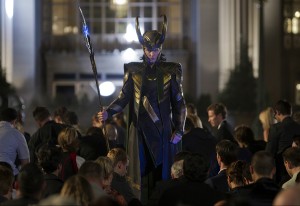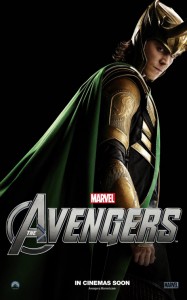The AVENGERS: where Loki is right?
Marvel’s mixed menagerie of superheroes are assembled in The Avengers, bringing together the characters of this shared universe in a movie that shows how little they’re willing to share. Pride, jealousy, deception and bitterness permeate characters that aren’t automatically superfriends, a nice form of storytelling about superhumans that doesn’t forget they’re human.
The previous films, all linked by those intelligent enough to stay through the credits, all have their pros and cons. For me, Incredible Hulk’s the character is the one I’ve cared most strongly for, but his film was the weakest. The greatest characterization has been Robert Downey Junior’s Iron Man, and in my opinion director Joe Johnston put together the best made film with Captain America, and Thor contained the strongest villain with actor Tom Hiddleston’s portrayal of Loki.
In the hands of comic book writer and genre director Joss Whedon, all these disparate elements come together as if they were destined to be, with Loki as the antagonist with a team level threat that requires everyone bring their gifts to the table. While I thought the film would simply be another inadvertent expression of Romans chapter 12, or 1 Corinthians 12— about how we as a people need to bring our unique gifts to the table and each contribute our part, not disparaging or elevating one or the other but recognizing the importance of all– the movie had a surprising slice of insight by Loki, when he makes an assembled group of people bow before him. Read below (or check out the video review).
“Kneel before me. I said… KNEEL! Is not this simpler? Is this not your natural state? It’s the unspoken truth of humanity that you crave subjugation. The bright lure of freedom diminishes your life’s joy in a mad scramble for power. For identity. You were made to be ruled. In the end, you will always kneel.” – Loki
Were we made to kneel?
 Let’s examine this, shall we? It’s not a particularly American sentiment, certainly. Even Optimus Prime would argue that “Freedom is the right of all sentient beings”. We don’t generally think of bowing to an Emperor or pledging our subservience to be in line with freedom (whereas other cultures have and do). Our first response to Loki’s statement is one that looks less like bended knee and more like a particularly raised finger. I suspect there will be rowdy cries of “hell, no!” in the theaters in response to Loki’s assertion.
Let’s examine this, shall we? It’s not a particularly American sentiment, certainly. Even Optimus Prime would argue that “Freedom is the right of all sentient beings”. We don’t generally think of bowing to an Emperor or pledging our subservience to be in line with freedom (whereas other cultures have and do). Our first response to Loki’s statement is one that looks less like bended knee and more like a particularly raised finger. I suspect there will be rowdy cries of “hell, no!” in the theaters in response to Loki’s assertion.
The problem is, there’s truth in his words.
Even a lot of professing Christians live life as if God exists as accompaniment to their self-centered universe, a force that exists to serve their needs, and although they’d never dare say it, the way they actually picture the relationship looks more like he’s kneeling to serve them. We forget a basic part of who we are and how we were made:
“Oh come, let us worship and bow down; let us kneel before the LORD, our Maker!” – Psalm 95:6
Loki is right, and it doesn’t get any clearer than in the psalmist King David’s words: we were made to kneel.
Do we crave subjugation?
 What of this statement then? Do we willingly shackle ourselves and lose our joy? Scripture is clear that the proper posture before the true creator brings joy, not the other way around. Still, that same scripture tells us exactly how we enslave ourselves to oppressive people and things:
What of this statement then? Do we willingly shackle ourselves and lose our joy? Scripture is clear that the proper posture before the true creator brings joy, not the other way around. Still, that same scripture tells us exactly how we enslave ourselves to oppressive people and things:
“… they exchanged the truth about God for a lie and worshiped and served the creature rather than the Creator…” – Romans 1:25
We lose our joy in a mad scramble for identity by attaching it to something lesser, binding our hopes and dreams to a celebrity, a politician, a spouse, a fictional universe or hero, a national identity, a career, a co-dependent relationship, or vicarious achievements through our children. We “freely” soil our knees on these shifting foundations hoping these things will satisfy, give us purpose and worth. Worst, we effectively see ourselves as “god”, the center of our own life and universe, and find ourselves kneeling to an identity that is certain to let us down, shackled to our own fallibility and finitude.
Loki is right again: we crave subjugation and lose our joy, chasing a “freedom” (that is actually enslavement) and declaring it as our identity.
What is our identity?
It’s not just about dusting off our knees and rejecting the wrong identities, we need to know our actual identity. Scripture suggests we all – and each – have a job description:
 “For we are his workmanship, created in Christ Jesus for good works, which God prepared beforehand, that we should walk in them.” – Ephesians 2:10
“For we are his workmanship, created in Christ Jesus for good works, which God prepared beforehand, that we should walk in them.” – Ephesians 2:10
That job description for all mankind makes us subject to the one true God, but with an amazing freedom and responsibility. We’re not meant to be subjugated by anything else. We have a dominion to wisely oversee and steward (and protect):
“Let us make man in our image, after our likeness. And let them have dominion… over all the earth and over every creeping thing that creeps on the earth.” – Genesis 1:26-28
Loki is right: we don’t need to scramble for identity, we just need to submit to and embrace the one declared by God.
Of course, Loki is also grossly, simultaneously, and obviously mistaken all at the same time , and we’ll be sure to cover that in the next post.




Great thoughts. Can’t wait for the next post.
Good points throughout. Loved the film immensely.
I’d make a case that Iron Man 2 was actually the weakest of the block of films. That film felt overcrowded with characters and some scenes had uneven pacing or dragged in places. One scene in particular felt very awkward and hard to watch (drunken fighting in armor at a party). I never felt that way with Hulk’s film, which had a good flow of narrative and was easy to follow, while still exciting in just the right moments.
As a Hulk fan since age 5 and owner of over 500 issues, I did like Norton’s Hulk… but didn’t feel the director gave Banner enough room to breathe and really convey the tragedy of his struggle. Allegedly much of the film’s human drama was left on the cutting room floor thanks to the director who gave us “The Transporter”, and this is part of why Norton bowed out of returning. Hulk shouldn’t have the pace of a Jason Statham movie, and I’d love a re-cut version with a few more scenes to flesh out the characters.
I think as a stand-alone film you’re right about Iron Man 2, but as a meaty middle to a trilogy I think it can work. Guess we need 3 to tell the tale.
Also, the Norton film had a scene where Banner does seek suicide as an option (as mentioned in The Avengers). That was cut too and appears as a deleted scene. I’m glad they brought it back as a concept in the new film.
I’m glad I’m not the only one who thinks Captain America is the best of them, and I think Chris Evans did quite a good job both in that movie as in the avengers.
Interesting enough, Loki wanted humans to kneel, but he wouldn’t “kneel” to Odin in Thor.
This article was incredible. I felt convicted as I read it. The Scriptures you used perfectly fleshed out the biblical parallels found in the film. You’ve really unpacked and expanded the truth in this film.
*I saw it twice so far, it’s excellent!
Thanks Aaron. I hear that the 3rd times a charm:)
I cannot believe it i thought the exact same thing when i watched it. I enjoyed Loki’s character far more than the others. Even though he was portrayed as the evil one he was fundamentally right, but this is just another typical HollyWood anti-god propaganda put in a movie. People don’t realize it but just for a moment watch movies and think of what is truly right and wrong and you will see how much the movie industry makes the evil appear as good and the good as evil.
I think Captain America’s line tempers the “anti-God” angle quite a bit Michael. Plenty of people will show up and try to play God. Even the old original “Frankenstein” story could be considered an anti-God message as (in the book) the maker is fallible and his creation more misunderstood than evil. Not to mention, the Devil’s BEST tactic is not just lying, but telling 98% truth and just tweaking the end. In this way Loki might reflect Satan – the “accuser” – pretty well, telling us things about ourselves that are true but not pointing to the right remedy. So… maybe you and I shouldn’t like him TOO much:)
loki is the best
Loki is right in reference to most humanity. Loki is wrong in reference to Israel. The difference is most people are bricks serving whoever while those who are stones serve the Creator.
We may be on the same wavelength, Josshua, though may I assume you mean spiritual Israel, as we know, since the proclivities for calf-worshipping and betrayal have been prevalent throughout the Bible insofar as the simple affiliation as Israel. Romans 9 says: “But it is not as though the word of God has failed. For not all who are descended from Israel belong to Israel, and not all are children of Abraham because they are his offspring, but “Through Isaac shall your offspring be named. This means that it is not the children of the flesh who are the children of God, but the children of the promise are counted as offspring.”